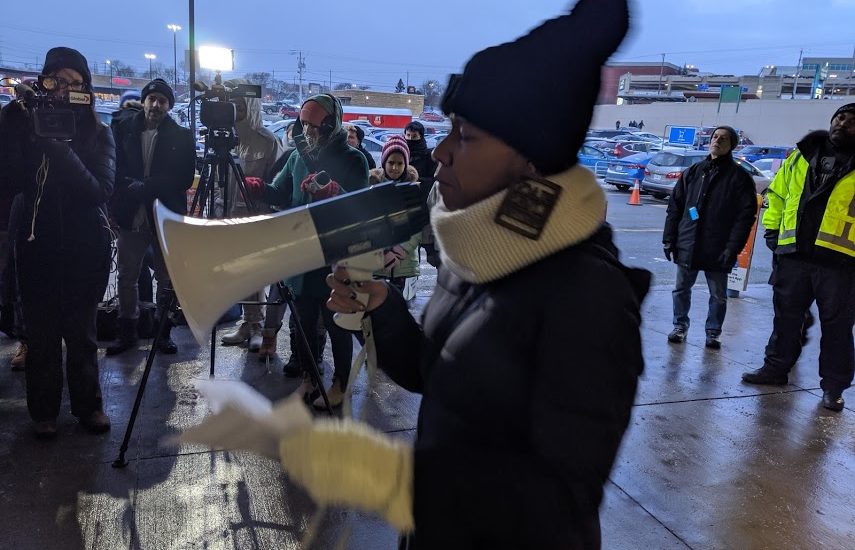
KJIPUKTUK (Halifax) – As I was on my way to the Pictou Courthouse the other day I was thinking about the panel discussion on reparations I attended the evening before in Halifax.
I was going to Pictou to deliver a community impact statement at the sentencing of Shawn Wade Hynes, the man convicted of criminal negligence causing harm and assault with a weapon in the 2018 traumatic and heinous nail gun attack of Nhlanhla Dlamini.
See also: Assailant of Nhlanhla Dlamini found guilty of criminal negligence and assault with a weapon
I reflected on the parallels between the reparation meeting and the blatant slave owner-like language Shawn Hynes used in his interactions with Nhlanhla before the nail gun attack that punctured his lung. I thought about the brutal disregard for this young Black man’s life.
My mind flipped channels to last month’s events, when Santina Rao’s safety was violated by Halifax Regional Police, Walmart and security guards in front of her young children. Concerns for her life and the lives of her babies were disregarded as police officers threw her to the ground and punched her, causing serious injuries including a broken wrist and a concussion.
See also: Protesters rally at Walmart in support of Santina Rao
The trauma wheel of racism continued to turn in my mind as I recalled recent and countless incidents close and close enough, and nausea entered my soul. I reflected on the parallels between today’s anti-Black racism and slavery and the hateful practices of the civil rights era. No surprise, they are the same. As I pondered the evidence in the case for reparations it all became much clearer to me.
Black people, and worse, Black children, were robbed of their innocence, value, rights and protection then and now. The trauma that slavery and the Jim Crow era produced continues to assault and injure our children today, and we need to talk about it. Slavery’s imprint and footprints continue to harm us.
Ironically, failure to repair, restore or make amends for the wrongdoing results in further harm. The denial of a process to repair injuries causes the injury to be ignored and creates further injuries and further needs for reparations.
In court a judge orders reparations to be paid to victims of a crime, and victim services will support the victims throughout the proceedings and help in obtaining access to mental health and medical support and counselling. The impact of a crime may affect an entire community of secondary victims.
Reparations aside, none of these services are even available or accessible to the many victims injured by the slavery-embedded anti- Black racist behaviour that continues to wreak havoc in Nova Scotia in 2020 without interuption.
Continuing to ask us to “wait’ for human rights is as silly as asking you put racism on pause while we are waiting.
Reparations is an initiative Dr. Lynn Jones, my dear friend and mentor, has been championing for a very long time, and recently I have come to better understand what exactly reparations entails and how I can participate in the conversation. Lynn encourages everyone to learn more about reparations, reflect on what it means individually and collectively and stresses the importance of including reparations in every community and political conversation you engage in.
See also: Community meeting explores the case for reparations to African Nova Scotians
So as I was pondering along in the depths of “then and now” I blurted out loud, “That’s it! If reparations considered and included individual victim impact and community impact statements then the correlation and effects could easily be tied back to the root of the injury – slavery and the heinous crimes perpetrated on humanity.”
I didn’t have to search far, because individual and community impact statements in 2018 and 2019 alone would be evidence enough of the ongoing injury of slavery. African Nova Scotians certainly have felt the effects of the racial intolerances of white Nova Scotians and their leaders these last two years. Throw in a good bucket of chicken and an old Negro spiritual and one would think we entered Narnia’s closet and returned to Mississipi!
As with many victims of long term abuse there is a grooming process, and the same is true for the victims of racism. Slavery, segregation and systemic racism have all groomed the children for their abuse, and taught them that they are inferior, they are powerless and bad things will happen to them and their family if they dare to speak out.
When you view the complex dynamics of racism you are better able to understand why some of its victims are more apt to ignore the abuse or become more accepting of the abuse than others.
Not all victims of physical and sexual assault speak out, but their silence does not legitimize the abuse or erase the victims. In fact, it is further evidence of its psychological damage. Being a community grassroots activist and advocate I am often privy to many racist assaults that go unreported out of a fear of reprisal, concern about health consequences, exhaustion, hopelessness or misplaced shame.
Our schools, colleges, universities and athletic organizations are consistently at the root of many oppressive and racist behaviours and scandals, both publicly and more hidden from view, say on car rides home. Our healthcare system continues to devalue Black bodies and marginalize and ignore Black illness and voices, as stories in the media and around kitchen tables remind us.
Our public and private sector workplaces have over and over proven to be unsafe spaces for People of Colour.. Our justice structure still operates in an oppressive and anti-Black manner engaging in racial profiling, harassment, street checks and disproportionate imprisonment. All this is reported and documented in reports, but let us not forget the countless untold stories buried in our hearts and etched in permanent memory. The ones less visible or hidden under gag orders.
Due to all this Black people continue to be unsafe in public spaces, meanwhile people in power in this province continue to fail to protect us from these assaults.
Not only is there a well documented case for reparations, governments have accepted their responsibility in the claims of injury, exclusion and disparity stated in the many reports, from the BLAC Report on education in 1994, to the UN report in May of 2017, to last year’s Wortley report on street checks, and every report in between.
See also: African Nova Scotian coalition doesn’t want UN report collecting dust on a shelf
Anti-Black racist practices woven into these reports all have a root cause, and that root cause is slavery. It would be callous to ignore or refuse to identify slavery as being the aggravating factor to the current racial abuse in today’s society. Such a blind eye would be wilful.
Reparations aren’t all about monetary compensation, it also includes a comprehensive strategy to decrease the gaps. For example, consider how education was denied for hundreds of years, and then plagued with abuse that streamlined our children out of the classroom and into youth detention and prison. It stands to reason that part of a reparation strategy should include a primary to post secondary education plan with increased incentives and supports to address the effects of the generational injuries that continue to affect our wealth, health and participation today.
The big challenge will be to build longevity into the structure of reparations, so that we continue to address the ongoing injuries and disparities for generations. Reparations implies restoration.
When we have acknowledged, addressed and restored African Nova Scotians’ hierarchy of needs, be the land, education, employment, housing and justice at the systems level, then and only then will we achieve the equality and freedom promised and so long overdue.
There is a significant balance owing and we cannot afford to fall prey to fleeting sums of money or fluff programming while continuing to keep us from making decisions that impact us across generations. Reparations require every African Nova Scotian to participate including people from the rural areas.
The evidence and framework for reparations is already embedded in the wisdom and trauma of our elders and our youth, we require all of you to get this job done.
So how do you become involved? Attend the meetings on reparations, research, learn more, ask a friend, request an information session in your region, recruit others, share your knowledge every chance you get and support the reparations portfolio .
What can you contribute? Everything! Your stories, knowledge and experiences are the groundwork on which the framework for reparations will be built. Reparations are a critical part to our healing, safety, economic and social growth. Without reparations the damage continues unaddressed, without recourse or repair. If ever there was a time where we could make the claim for reparations, the moment is now.
What can our allies do? Walk in front of us and open doors we cannot enter. Educate yourself and attend meetings so you can champion reparations in your circles and stand behind us and support our voices. Committing to repair the ongoing damage done by the crimes of your ancestors is your responsibility.
We all have a duty to advocate for the children who continue to be born as victims. We are those children. Failure to provide reparations has injured all of us for decades and decades.
Imagine the physical and psychological consequences of “knowing your place” in the 40s, 50’s, 60’s and 70’s? Imagine how those decades created and affected the 80,s 90’s, 2000’s and ongoing. Every single day we wake up to the ongoing damage caused by slavery. Everyday Blacks are struggling in the rubble of the slavery aftermath to survive, provide and make ends meet. Everyday we see horrible racism and its injuries, and wish it would end! Continuing to ignore these injuries today and their roots in slavery is negligent and criminal.
Reparations will help us realize the freedom that was taken from us, the liberty that our ancestors fought so hard for and relieve the burden that we continue to carry.
Note that on Friday, February 29, a full day event focusing on reparations will be happening at the North Branch Library in Halifax, from 10am to 4pm.
See also: Angela Bowden: Africa – On growing up Black in Nova Scotia
With a special thanks to our generous donors who make publication of the Nova Scotia Advocate possible.
Subscribe to the Nova Scotia Advocate weekly digest and never miss an article again. It’s free!




The public also has to know that Dalhousie University’s Facilities Management undertakes two different sectors of our labour force industries. Skilled Trades, as well Tourism and Hospitality Services. Custodians are a diverse group of individual employee’s whom for the most part make up the majority of NSGEU’s racially segregated collective bargaining agreement. Although NSGEU negotiates wages for both industry groups, there actually capitalizing off individual lives. Disregarding Occupational Health and Safety as an inclusive right, woman and other ethnic minorities coming forward with any such grievances or safety concerns receive differential treatment. In my case, NSGEU ignored my grievances which part and parcelled a formidable excuse the administration desperately needed to commit ill malicious intent. After being denied a claim of Ltd.benefits, the sick leave administrator forged another stating I suffered 5 years depression. After sending me off on sick leave, once I returned, they staged an event on campus which discrimently had me criminally profiled to police I’ve recently learned, by them saying I wanted to shoot someone. Of course Ltd. approved her bogus claim. I went through multiple psychiatric evaluations, medicated throughout the process, then abandoned by Ltd., again medically cleared to return, they basically kept insinuating I was crazy. No income, I had to resign. “Both in substance and process,“ that’s definitely discrimination. I’m the fallout from these Quid pro quo! type of practices. Till this day I suffer mentally and emotionally. “Post Traumatic Slave Disorder Syndrome.“ NSHRC is the only modern day Underground Railroad for people like myself whom after escaping, I was sent by lawyers to hold those accountable for their actions. I lodged my complaint into NSHRC on time but ironically, they’ve always maintained the excuse my file somehow got lost. NSGEU has established themselves to be our largest union here in Nova Scotia. There complicit in this discriminatory behavioural practices, but also intent on allowing Dalhousie to continuing fortifying Lord Dalhousie’s legacy as a colonial slave market trader still secretly embedded within the confines of that institution.
Dalhousie is known as one of our most reputable educational institutions in Nova Scotia.
There committing crimes against the whole of our society. It’s just plan Ignorant!